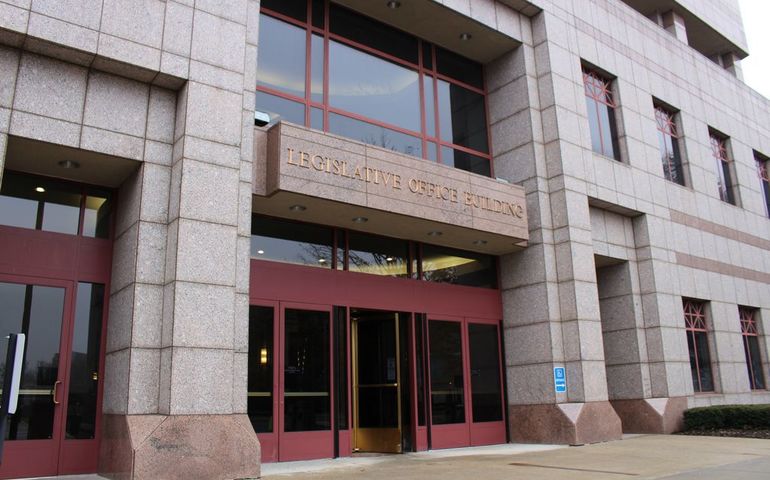Processing Your Payment
Please do not leave this page until complete. This can take a few moments.
- News
-
Editions
View Digital Editions
Biweekly Issues
- May 13, 2024
- April 29, 2024
- April 15, 2024
- April 1, 2024
- March 18, 2024
- March 4, 2024
- February 19, 2024
- February 5, 2024
- January 22, 2024
- + More
Special Editions
- Lists
- Viewpoints
- HBJ Events
- Business Calendar
- Custom Content
Special session on hospital settlement is Dec. 18
 HBJ Photo | Joe Cooper
Connecticut's Legislative Office Building in Hartford.
HBJ Photo | Joe Cooper
Connecticut's Legislative Office Building in Hartford.
The General Assembly is convening a one-day special session next week to vote on the acceptance of a $1.8 billion settlement of a tax fight with the hospital industry and a revised version of a restaurant tip-credit bill vetoed in July, legislative leaders said Tuesday.
Senate President Pro Tem Martin M. Looney, D-New Haven, and House Majority Leader Matt Ritter, D-Hartford, said in separate interviews that the House and Senate are ready to take up those two non-partisan issues on Dec. 18.
A second special session to authorize truck tolls to finance a 10-year, $19.4 billion transportation infrastructure program will be held in January, they said.
Gov. Ned Lamont alone had been pressing for an earlier vote on transportation, but legislative leaders have said consistently that a vote could not be scheduled before January due to unavailability of some lawmakers. With Republicans opposed to any bill with tolls or other new revenue sources, the absence of Democrats would endanger passage.
The governor and Democratic legislative leaders issued a joint statement Tuesday saying that Democrats are committed to return in early January to pass a transportation plan and a bonding bill necessary for the state to deliver town aid for roads and local capital projects.
“Once the bill is passed, we are committed to scheduling an immediate meeting of the Bond Commission to allocate bonding to cities and towns,” they said.
Lamont said earlier Tuesday that lawmakers will hold a public hearing on the transportation bill. His office released financial information and toll rates on Friday.
Avoiding liability bill
Without the hospital settlement, the state is facing a potential liability of $4 billion. Legislators are holding a public hearing Friday on the deal, but leaders say they see no obstacles to acceptance by the General Assembly.
“We’ve had our caucus counsel review it to make sure there is nothing to forestall us from undertaking consumer legislation to curb anti-competitive practices,” Looney said. “So far, we haven’t been able to find anything that raises concern.”
Ritter called the settlement “a major victory for the governor’s office and Bob Clark.” Clark is the governor’s general counsel.
In a lawsuit filed in 2015, the hospitals accused Connecticut of abusing the provider tax imposed by the 2011 General Assembly and Gov. Dannel P. Malloy as a means to leverage increased federal Medicaid payments to the state. The original intent was for the state to return the tax to the hospitals in the form of supplemental payments.
The hospitals complained that the state reneged on the promised supplemental payments. As state government struggled with budget deficits between 2013 and 2017, the provider tax grew while the payments back to the hospitals shrank.
Legislators also are expected to vote next week on a revised version of a restaurant tip-credit bill that Lamont vetoed in July, saying it would have stripped restaurant workers of the right to pursue claims of unpaid wages in certain circumstances.
The governor is proposing instead to limit damages they could collect from restaurants that relied on inaccurate advice from the Department of Labor in calculating tip-credit wages.
At issue is the legislature’s hurried efforts on the last night of the 2019 legislative session to protect restaurants from a spate of lawsuits over the split wage system for wait staff and bartenders. They can be legally paid less than minimum wage when they are getting tips, but not when they are doing non-service work.

2022 Giving Guide
This special edition informs and connects businesses with nonprofit organizations that are aligned with what they care about. Each nonprofit profile provides a crisp snapshot of the organization’s mission, goals, area of service, giving and volunteer opportunities and board leadership.
Learn more
Subscribe
Hartford Business Journal provides the top coverage of news, trends, data, politics and personalities of the area’s business community. Get the news and information you need from the award-winning writers at HBJ. Don’t miss out - subscribe today.
Subscribe
2024 Book of Lists
Delivering Vital Marketplace Content and Context to Senior Decision Makers Throughout Greater Hartford and the State ... All Year Long!
Read Here-
2022 Giving Guide
This special edition informs and connects businesses with nonprofit organizations that are aligned with what they care about. Each nonprofit profile provides a crisp snapshot of the organization’s mission, goals, area of service, giving and volunteer opportunities and board leadership.
-
Subscribe
Hartford Business Journal provides the top coverage of news, trends, data, politics and personalities of the area’s business community. Get the news and information you need from the award-winning writers at HBJ. Don’t miss out - subscribe today.
-
2024 Book of Lists
Delivering Vital Marketplace Content and Context to Senior Decision Makers Throughout Greater Hartford and the State ... All Year Long!
ABOUT
ADVERTISE
NEW ENGLAND BUSINESS MEDIA SITES
No articles left
Get access now
In order to use this feature, we need some information from you. You can also login or register for a free account.
By clicking submit you are agreeing to our cookie usage and Privacy Policy
Already have an account? Login
Already have an account? Login
Want to create an account? Register
Get access now
In order to use this feature, we need some information from you. You can also login or register for a free account.
By clicking submit you are agreeing to our cookie usage and Privacy Policy
Already have an account? Login
Already have an account? Login
Want to create an account? Register






0 Comments